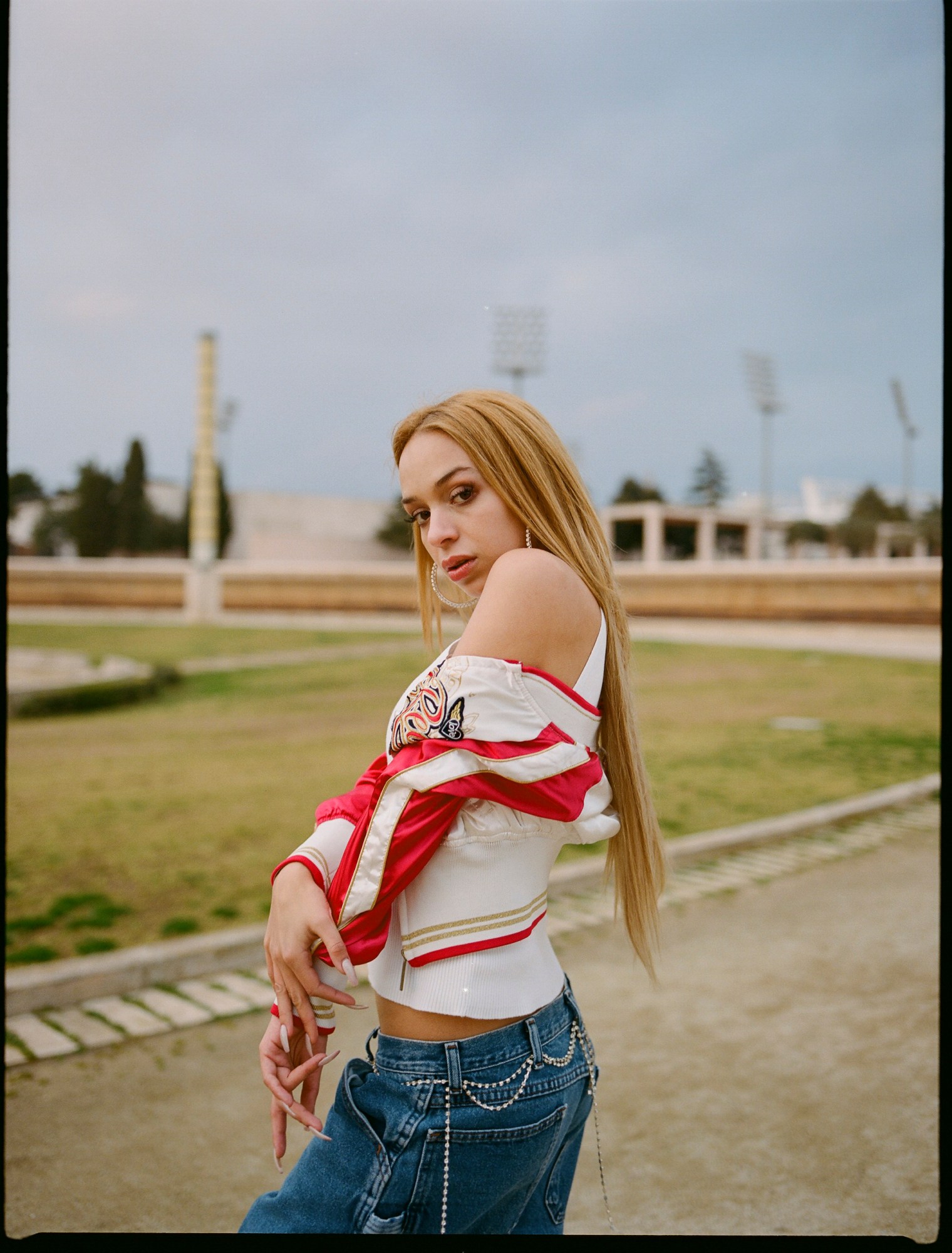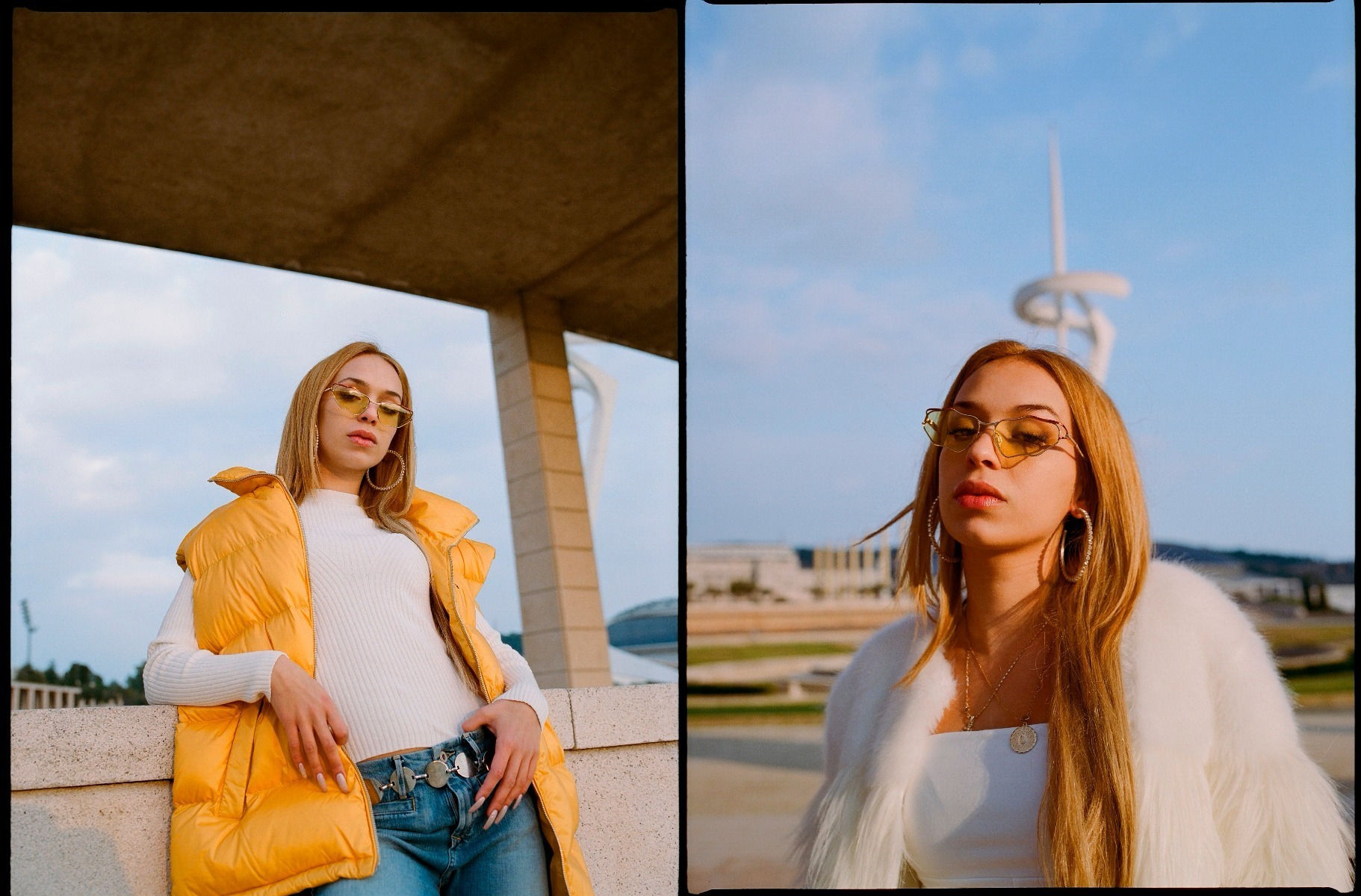When most people hear the words “Bad Gyal” they think of Rihanna — but that’s only if they haven’t heard the powerful sounds of 20-year-old Alba Farelo, whose signature blend of dancehall-meets-reggaeton beats and Catalan lyrics have made her the only Bad Gyal you need to know. From the viral video for her Catalan cover of Rihanna’s “Work,” to her new mixtape, Worldwide Angel, the singer is transforming the often misogynistic world of dancehall and refusing labels when it comes to her music — and herself. “I can’t categorize myself, so I can’t categorize my music,” she says. “I just make the kind of music that I listen to, and write whatever is in my head.”
Raised in the Spanish village of Villasar de Mar, Farelo discovered dancehall in the same way most teenagers first find music: on MTV. After seeing an advertisement for Sean Paul’s upcoming album, The Trinity, she begged her parents to buy the CD for her eighth birthday. “That was the first time I ever heard music like that,” Alba explains. “But I had no idea what they were saying or where it was coming from. When I got the record, I even asked my father what ‘Ever Blazin’’ meant. So, I wasn’t contextualizing it. But I loved it.”
From there, Alba found her way to the local reggaeton scene, and continued diving deeper into dancehall. But it wasn’t until 2016, when she uploaded that cover of Drake and Rihanna’s “Work” titled “Pai” to YouTube under the name the Bad Gyal, that she realized she could do it herself. Since then, the video has racked up over 2.2 million views while the singer has toured the world and released two mixtapes, including last month’s Worldwide Angel. A fiery mix of reggaeton beats and auto-tuned pop hooks featuring collaborations with UK producer Jam City and Spanish musician El Guincho, among others, the album gives Bad Gyal a place in the dancehall canon, even if she is from the coast of Spain. Though many critics have challenged her use of Jamaican culture — from her music to the name Bad Gyal itself (which is a common Patois phrase) — Alba insists she’s not appropriating, but rather celebrating the influence. “I’m just me,” says the singer, “and I’ve never tried to be anything else.”
Below, i-D talks to Bad Gyal about authenticity and why she won’t be changing her name.

How did you get into music? Did you always want to be a singer?
It’s not like I was ever pushing myself or imagining myself as a singer, or even wanting to do music and become one. But I’ve always been really interested in music in a natural way. Singing and dancing — everything involved in making music — just always made me feel really, really good. I only started actually doing it because of everything that was happening in my life at the time. Before that, I’d never felt the necessity to make music — I’d just enjoyed it. But then, I felt like I had to do it to survive.
How would you describe your sound?
My music is a reflection of what’s happened to me and what makes me feel inspired. Everything I make is just a louder version of what’s inside my head. So, it’s hard for me to describe because it’s not just a sound — it’s who I am, and my life.
Similarly to hip-hop, both dancehall and reggaeton have been criticized for their misogynistic treatment of women in videos and lyrics. How has your experience as a woman been in these often male-dominated environments?
At the end of the day, I really don’t think it’s that special. I mean, I don’t know — maybe it’s the first step to accepting that it’s a normal thing, that woman can also make any type of music and enjoy reggae, or dancehall, or anything else that they like. But I just don’t feel special because I’m a woman.
Do you consider your music feminist?
I don’t consider my music anything — it’s just my perspective on life, and I don’t have questions in my head where I need to try to figure out what I’m saying behind my songs. I just write whatever is in my head at the moment, even if it’s not important.
Like what?
Just things that make me laugh or feel funny, or things that I like doing. Like, if I talk about dancing, I enjoy hearing that, and when they play it in a club, I’ll want to dance. But that also doesn’t mean the message in my life is, ‘I only feel good when I’m dancing.’ I just like to make music like that.

Let’s talk about your name, Bad Gyal. I know a lot of people have accused you of cultural appropriation due to the name’s history and relationship with Jamaican Patois.
I was actually thinking a lot about changing it recently. When I came up with it, I really didn’t think much about it — it was just this dumb thing that I heard in a lot of the songs I was listening to. So, when people started reacting to it and saying it was [cultural appropriation], I was just really, really shocked. At the time, I was — I wouldn’t say innocent — but I really just didn’t know much. I was living in my own world and couldn’t understand how some people could think I was trying to be disrespectful, or attacking another culture, or stealing it. That was just not even an option in my mind. I’ve been listening to Jamaican music for many years, before I even knew it was dancehall. So, even before I knew what it was, I was loving it. That’s why I never felt like it was disrespecting the culture. But now that I’ve actually been to Jamaica and met so many different people, I feel different. I don’t know, it’s not like I’ve ever felt like I was Jamaican, or that I was trying to tell people that I was. I have my own reality that I’m happy with. It’s my life, and I don’t want to convince myself or others that I’m not what I am.
So, why have you decided to stick with the name?
Even though sometimes I feel like “Bad Gyal” is not my word, I still like the meaning and identify very strongly with it. Of course, not all the time, because everyone has lots of different moods. But I still feel like it’s me, and I like what it means, and I can still show respect to that culture by trying to make dancehall as big as possible, to share the culture so that the people who started it can be the ones who profit off of it, because that’s what they deserve.
You said you started writing music out of necessity, as a way of dealing with your emotions. Is that still the case?
When I’m feeling bad, I still do music, but I also do it in a lot of different moods now, and for different reasons. I mean, it’s my career. So, it’s a necessity for me emotionally, but it’s also much bigger than that.
Has your songwriting process changed as your motivations have?
When I started, I was alone doing everything. Now, I’ll be on tour in Los Angeles and and my friends will make a beat for me. Then we’ll stay up all night, drinking and smoking lots of joints, just making music. But you can hear it in the songs — the ones I write at home are a lot more intimate. I’ll be listening to some music or Pablo, my DJ, will send me something, and I’ll smoke and think and just start writing. It’s just me thinking, ‘Do I like these here?’ ‘Do I want to change this?’I need that time where no one’s saying, ‘Can you try this? Can you do that other thing’ — where it’s just me, feeling good, doing my thing and creating.
How do you think you’ve grown as an artist since you first started performing?
I definitely figured out a bit more on the technical side of things, about how I want my sound to be, and I could tell the people I was working with what I wanted, too. So, I had a lot more opportunities and more people that wanted to work with me. But I also realized a lot about how I want to live my life as an artist, and as a public person.
And how’s that?
I need a lot of space to remind myself what’s real and what’s not, and just know how to separate those two things. I also need to give myself a break. I mean, I’ve learned a lot, but mostly, that there’s a lot more to learn. And I need to stay me, no matter what happens.
Credits
Photography Berta Pfirsich
Styling Rebeca Sueiro
